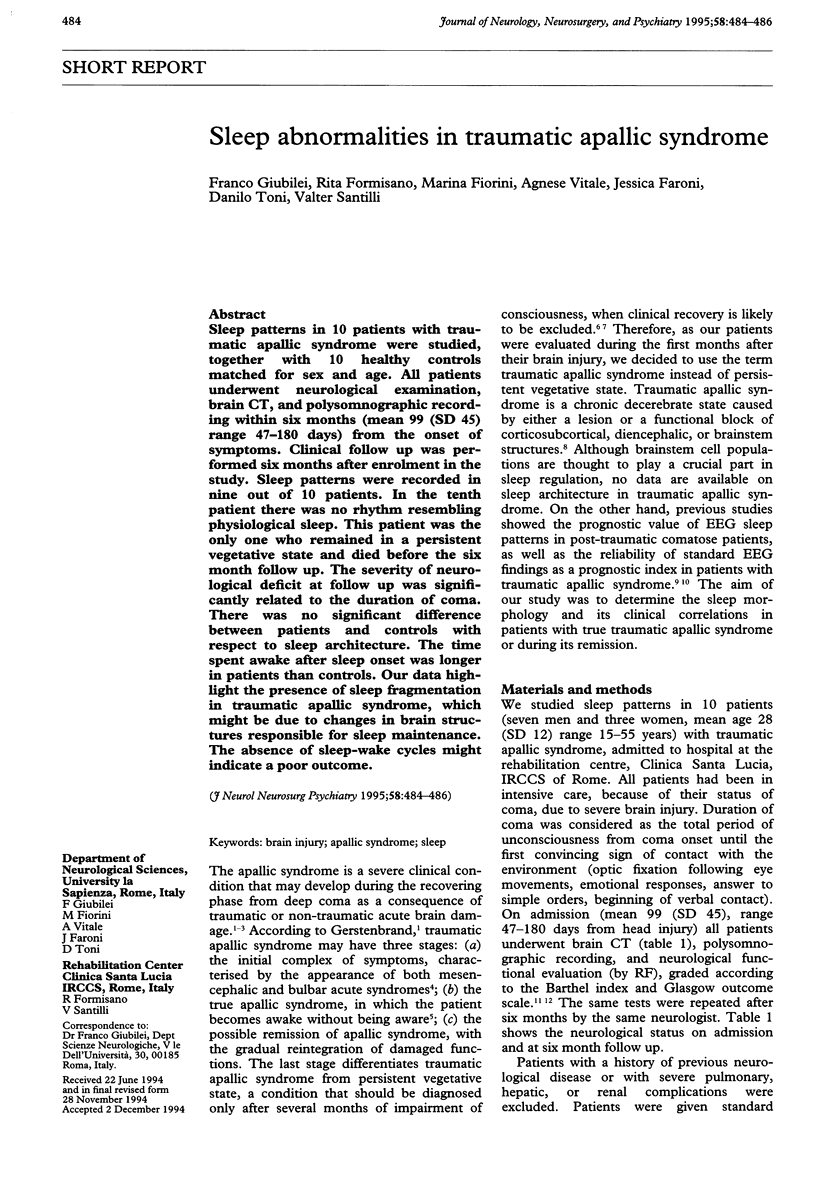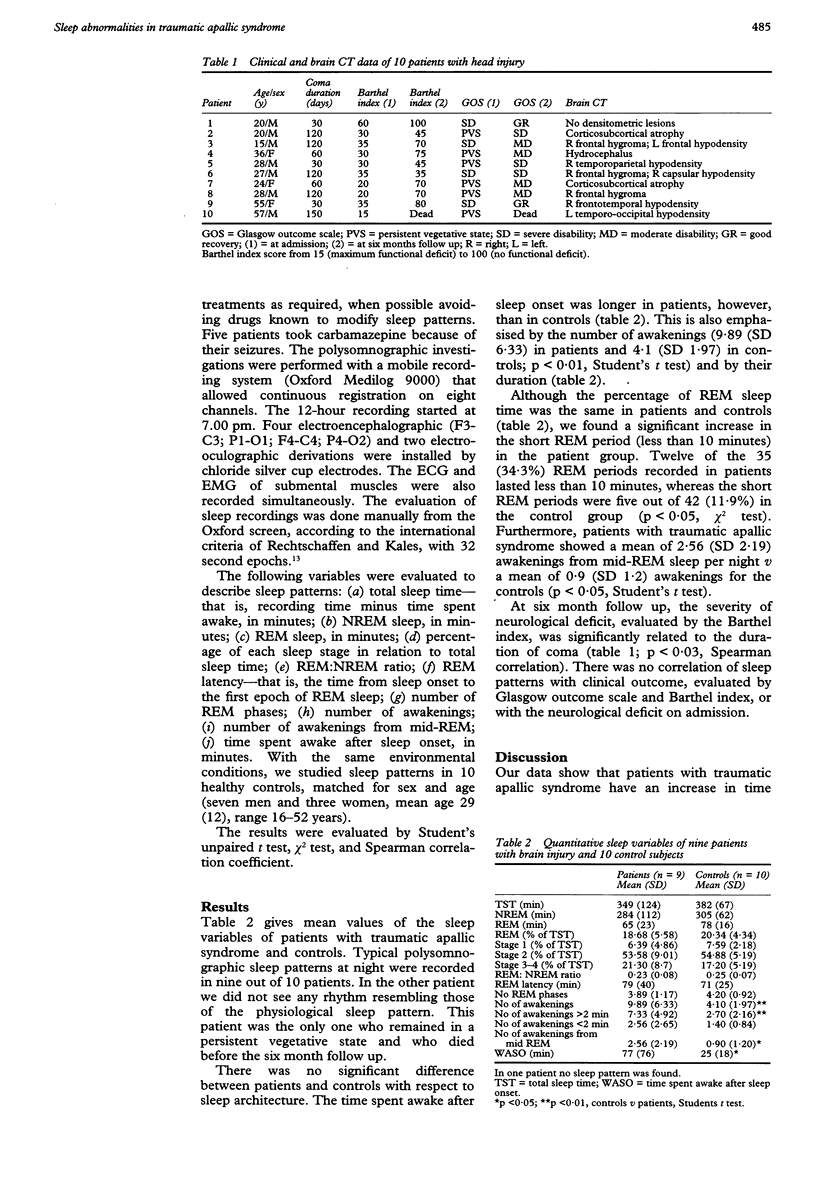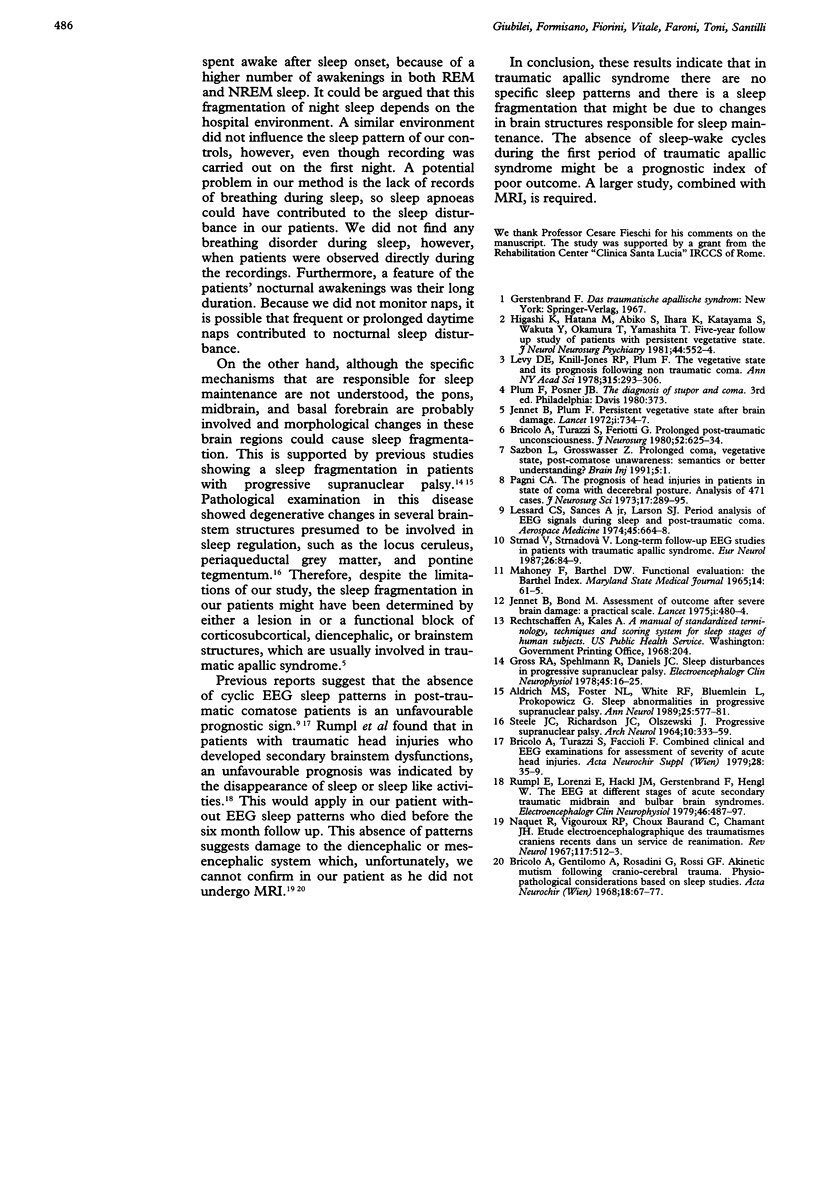Abstract
Sleep patterns in 10 patients with traumatic apallic syndrome were studied, together with 10 healthy controls matched for sex and age. All patients underwent neurological examination, brain CT, and polysomnographic recording within six months (mean 99 (SD 45) range 47-180 days) from the onset of symptoms. Clinical follow up was performed six months after enrollment in the study. Sleep patterns were recorded in nine out of 10 patients. In the tenth patient there was no rhythm resembling physiological sleep. This patient was the only one who remained in a persistent vegetative state and died before the six month follow up. The severity of neurological deficit at follow up was significantly related to the duration of coma. There was no significant difference between patients and controls with respect to sleep architecture. The time spent awake after sleep onset was longer in patients than controls. Our data highlight the presence of sleep fragmentation in traumatic apallic syndrome, which might be due to changes in brain structures responsible for sleep maintenance. The absence of sleep-wake cycles might indicate a poor outcome.
Full text
PDF


Selected References
These references are in PubMed. This may not be the complete list of references from this article.
- Aldrich M. S., Foster N. L., White R. F., Bluemlein L., Prokopowicz G. Sleep abnormalities in progressive supranuclear palsy. Ann Neurol. 1989 Jun;25(6):577–581. doi: 10.1002/ana.410250609. [DOI] [PubMed] [Google Scholar]
- Bricolo A., Turazzi S., Faccioli F. Combined clinical and EEG examinations for assessment of severity of acute head injuries. Acta Neurochir Suppl (Wien) 1979;28(1):35–39. doi: 10.1007/978-3-7091-4088-8_6. [DOI] [PubMed] [Google Scholar]
- Bricolo A., Turazzi S., Feriotti G. Prolonged posttraumatic unconsciousness: therapeutic assets and liabilities. J Neurosurg. 1980 May;52(5):625–634. doi: 10.3171/jns.1980.52.5.0625. [DOI] [PubMed] [Google Scholar]
- Gross R. A., Spehlmann R., Daniels J. C. Sleep disturbances in progressive supranuclear palsy. Electroencephalogr Clin Neurophysiol. 1978 Jul;45(1):16–25. doi: 10.1016/0013-4694(78)90337-1. [DOI] [PubMed] [Google Scholar]
- Jennett B., Bond M. Assessment of outcome after severe brain damage. Lancet. 1975 Mar 1;1(7905):480–484. doi: 10.1016/s0140-6736(75)92830-5. [DOI] [PubMed] [Google Scholar]
- Jennett B., Plum F. Persistent vegetative state after brain damage. A syndrome in search of a name. Lancet. 1972 Apr 1;1(7753):734–737. doi: 10.1016/s0140-6736(72)90242-5. [DOI] [PubMed] [Google Scholar]
- Levy D. E., Knill-Jones R. P., Plum F. The vegetative state and its prognosis following nontraumatic coma. Ann N Y Acad Sci. 1978 Nov 17;315:293–306. doi: 10.1111/j.1749-6632.1978.tb50347.x. [DOI] [PubMed] [Google Scholar]
- MAHONEY F. I., BARTHEL D. W. FUNCTIONAL EVALUATION: THE BARTHEL INDEX. Md State Med J. 1965 Feb;14:61–65. [PubMed] [Google Scholar]
- Naquet R., Vigouroux R. P., Choux M., Baurand C., Chamant J. H. Etude électroencéphalographique des traumatismes craniens récents dans un service de réanimation. Rev Neurol (Paris) 1967 Sep;117(3):512–513. [PubMed] [Google Scholar]
- Rumpl E., Lorenzi E., Hackl J. M., Gerstenbrand F., Hengl W. The EEG at different stages of acute secondary traumatic midbrain and bulbar brain syndromes. Electroencephalogr Clin Neurophysiol. 1979 May;46(5):487–497. doi: 10.1016/0013-4694(79)90002-6. [DOI] [PubMed] [Google Scholar]
- STEELE J. C., RICHARDSON J. C., OLSZEWSKI J. PROGRESSIVE SUPRANUCLEAR PALSY. A HETEROGENEOUS DEGENERATION INVOLVING THE BRAIN STEM, BASAL GANGLIA AND CEREBELLUM WITH VERTICAL GAZE AND PSEUDOBULBAR PALSY, NUCHAL DYSTONIA AND DEMENTIA. Arch Neurol. 1964 Apr;10:333–359. doi: 10.1001/archneur.1964.00460160003001. [DOI] [PubMed] [Google Scholar]
- Sazbon L., Groswasser Z. Prolonged coma, vegetative state, post-comatose unawareness: semantics or better understanding? Brain Inj. 1991 Jan-Mar;5(1):1–2. doi: 10.3109/02699059108998504. [DOI] [PubMed] [Google Scholar]
- Strnad P., Strnadová V. Long-term follow-up EEG studies in patients with traumatic apallic syndrome. Eur Neurol. 1987;26(2):84–89. doi: 10.1159/000116316. [DOI] [PubMed] [Google Scholar]



